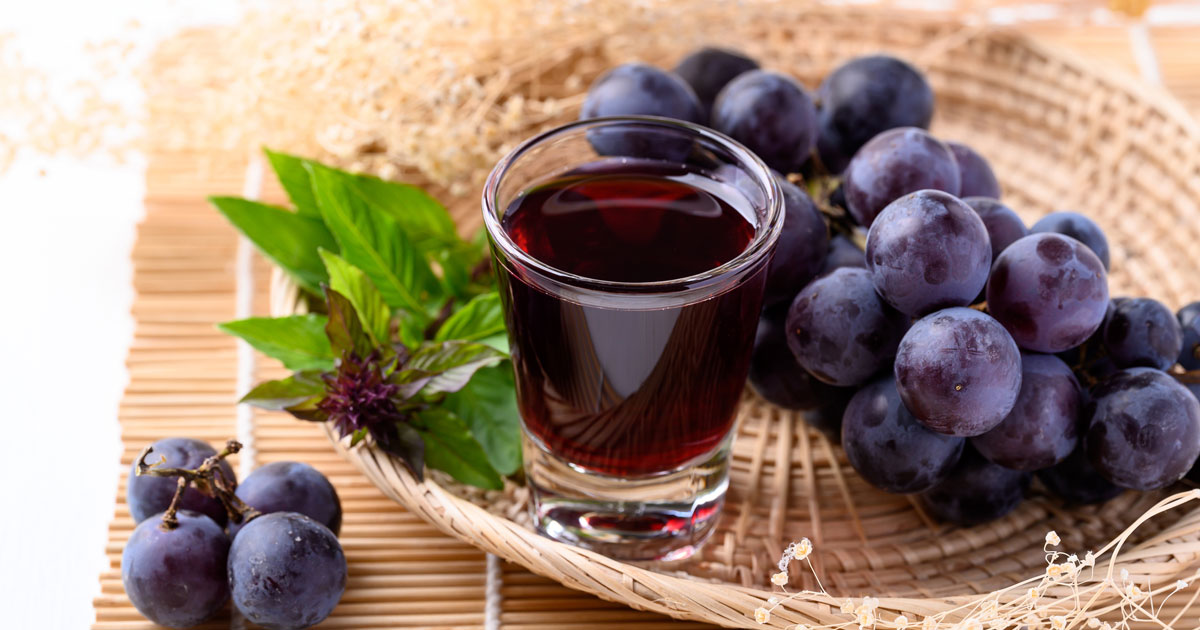
Though grapes have been cultivated in many places around the world for millennia, the Concord grape is a relatively new arrival. First developed in 1849 by Ephraim Wales Bull, this juicy and delicious cultivar went on to win top honors in the 1853 Boston Horticultural Society Exhibition. Since then, the Concord grape has been a fixture in American homes, mostly in the form of grape juice and grape jam. Yet while Concord grapes are known for their dark color and tangy flavor, they are also a great source of nutrients that are known to convey a variety of health benefits.
Concord grapes are named after the city of Concord, Massachusetts, the hometown of Ephraim Wales Bull and the site where he first developed them. Concord grapes are a cultivar of Vitis labrusca—also known as fox grapes—a variety that is the source of many other common grape cultivars. An attribute common to Concord grapes and other members of the fox grape species is that their skins easily slip off when squeezed rather than getting crushed with the pulp; this makes them especially useful for juicing purposes.
It didn’t take long for the new Concord grape cultivar to hit the market and become appealing beyond consuming whole grapes. In 1869, less than 20 years after the cultivar became available, Thomas Bramwell Welch developed the first grape juice through a method of pasteurization that prevented fermentation. What was originally intended as a teetotaling alternative to red wine in church services soon grew into the Welch’s Grape Juice Company that would make Concord grapes synonymous with purple grape juice.
Concord grapes are grown in many places around the United States, but their major growing areas are near the Finger Lakes in upstate New York, Washington state, and areas around the Great Lakes. And though they are sometimes sold as a “table grape” variety in the Northeast, the majority of production is centered around grape juice and grape jam and jelly. In fact, Concord grapes are the most common type used for almost any kind of grape flavoring in soft drinks, candy, fillings, and baked goods. They are also sometimes used to make kosher wines.
As is true with fruit juice consumption in general, the relative health and nutritional value of grape juice is dependent on how it is prepared and what is added in. Many bottled juices available at grocery stores have added sugars that generally detract from the overall healthiness of the drink. But grape juice in its purest form retains many of the nutrients found in Concord grapes themselves. Below are some of the health benefits associated with those nutrients:
One other point about grape juice that is worth noting is related to its alcoholic cousin, red wine. Over the decades, studies have shown some evidence that red wine might have health benefits; this is sometimes explored in the context of certain dietary traditions like Mediterranean cultures that are known to be long-lived and healthy. The truth is, though, that alcohol, while fine in moderation, has little if any benefits for one’s health. Grape juice, on the other hand, has the same basic contents as red wine without the alcohol and is likely to be a healthier alternative.
Like blueberries, strawberries, and cherries, concord grape is a classic American flavor that works well in beverages, cocktail mixes, hard seltzers, nutraceuticals, and many other applications. FruitSmart offers high quality grape juices, essences, concentrates, and purees that are versatile, flavorful, and full of nutritional value. Also, as part of a commitment to sustainability, some of the grape seeds, pulp, and skin is used in dry ingredients that can be added to nutrition bars and baked goods. At FruitSmart, we are excited to partner with you as you develop new products that will wow your customers. If you’d like to learn more about any of our products or what it’s like to work with FruitSmart, please contact us today.
